
Personal Development in Counselling
Definition of ‘personal development’ in counselling.
Personal development is ‘an essential aspect of training in person-centred psychology and person-centred therapy and, generally, takes place and is fostered in the training group (as distinct from individual personal therapy away from training)’ ( Tudor and Merry, 2002: 97–98 ).
In counselling, personal development is a way of enhancing self-awareness.
Importance of Self-Awareness in Counselling
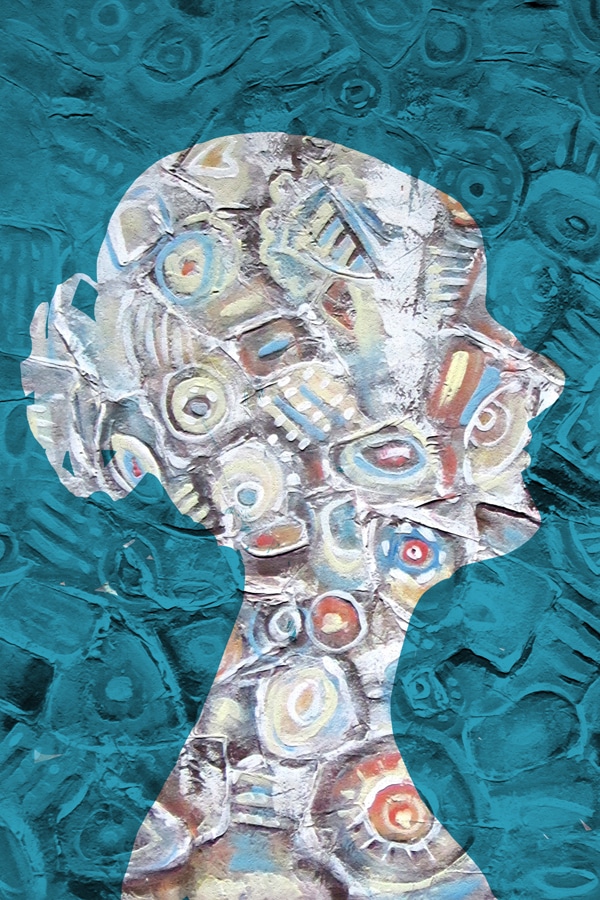
Self-awareness is important in person-centred counselling. If we have not looked at ourselves in depth, it will be very difficult to offer high-quality counselling to clients.
In counselling, we use ourselves as the main tool with which to help clients. If we have not looked at ourselves in depth, it will be very difficult to offer high-quality counselling to clients. We need self-awareness in order to help clients: accepting ourselves more fully allows us to offer the same acceptance to them.
To be able to deal with personal triggers in the counselling room, we must understand our own process, and so be able to spot and avoid parallel process. Sometimes, it may be necessary to take a break from counselling if we are dealing with a tough personal situation (e.g. bereavement or divorce). Not facing up to our own process risks damaging both ourselves and our clients.
If our personal development identifies that there are types of issues or clients that we cannot work ethically with (e.g. because of something in our own background or experience), then we must make a referral to a practitioner who is able to help.
Personal Development Linked to Theory
Self-awareness – gained through personal development – is perhaps especially important in person-centred counselling, which is all about relating to the client in a way that embodies the three core conditions of empathy, congruence and unconditional positive regard. Areas of incongruence within ourselves may prevent us from offering these conditions. Some examples would be as follows:
- If we had suffered a difficult loss that we had not addressed fully, and then a client’s story reminded us of our own experience, we might find it impossible to stay within their frame of reference, instead flipping back into our own feelings about our own loss. This would prevent us from providing the client with empathy (i.e. putting ourselves in their shoes, and accompanying them as they explore their emotions).
In counselling, we use ourselves as the main tool with which to help clients ... We need self-awareness in order to help clients: accepting ourselves more fully allows us to offer the same acceptance to them.
- If we had been brought up with the condition of worth that it was rude to challenge people in authority, we might then find it hard to be congruent with a client we perceived as more powerful than us in some way. This would stop us using the skill of challenge with the person, and so would undermine the therapeutic relationship, and fail to fulfil the six necessary and sufficient conditions of therapeutic personality change.
- If we had an unexplored prejudice against, say, people of a particular sexuality, then found ourselves with such a client in the counselling room, we may not be able to offer them unconditional positive regard . This would adversely affect the quality of service that we were able to provide to the client. It could even be harmful to them (for example, if their self-esteem has already been affected by such prejudice outside the counselling room) – so breaching the important ethical standard of non-maleficence (a commitment to avoiding harm to the client), as embodied in the Ethical Framework for the Counselling Professions .
Free Handout Download
6 Ways to Kick-Start Your Personal Development Plan
Methods of Personal Development
Counselling students are encouraged to use a range of different methods and tools to increase their self-awareness – for example, writing a reflective journal, using the Johari window, and participating in personal development groups. Personal counselling and supervision are also important in developing self-awareness, but are (as noted in the definition above) not always seen formally as part of personal development.
Johari Window
Devised in the USA by Joseph Luft and Harry Ingram in 1955, the Johari window (named by combining the two men’s names) is a tool to help people gain self-awareness and achieve personal growth. This comprises four ‘panes’, as shown in the picture. The idea is to expand the open area, for example by eliciting feedback from others.
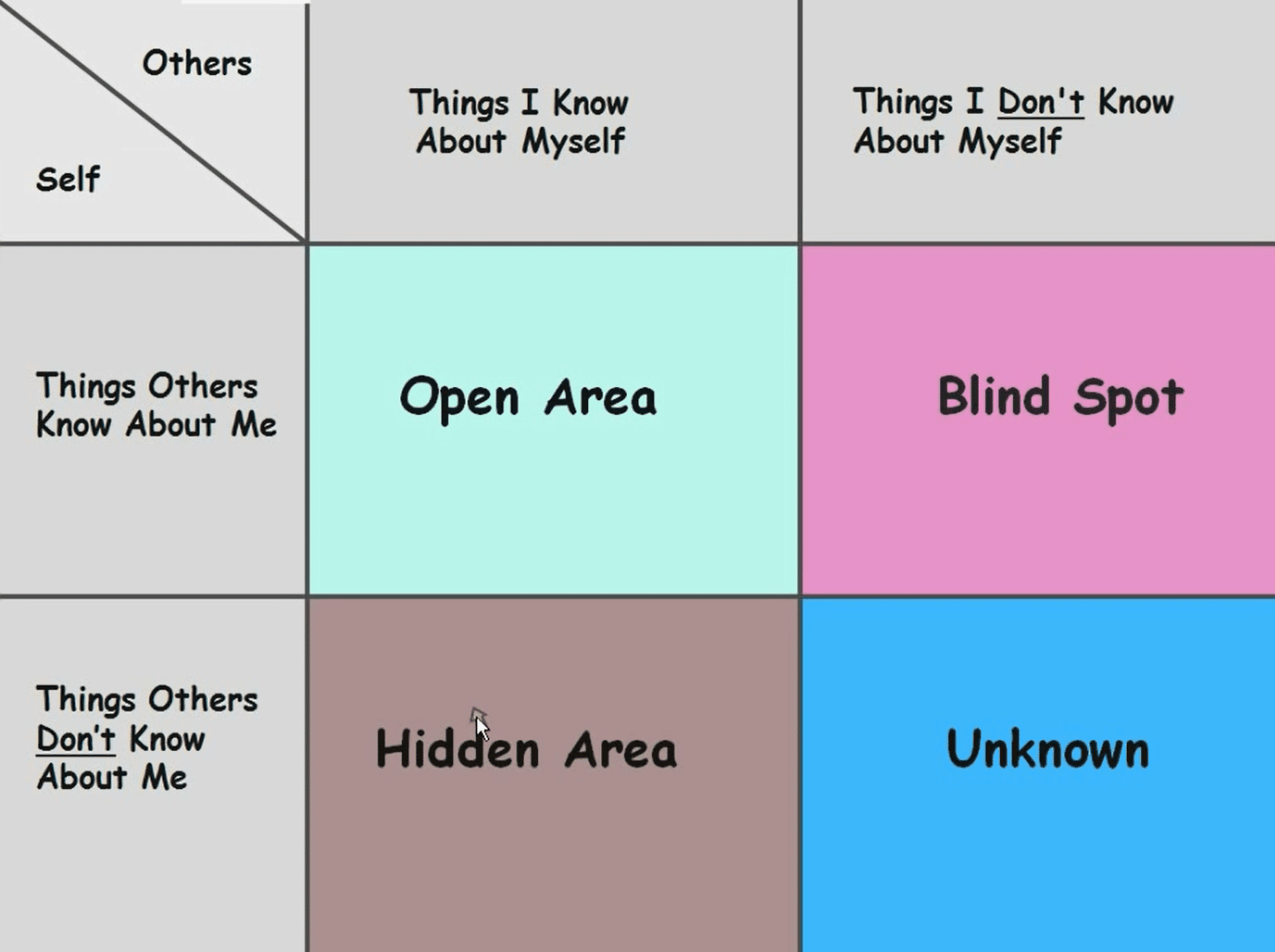
Personal Development Groups
These groups (sometimes known as ‘process groups’) are a core part of counselling training, complementing the input on theory and skills by providing a safe space for developing self-awareness. There, we can look at changes we are going through, find the courage to explore them, and get others’ views.
They can be very challenging, but also very enriching. They offer an opportunity both to increase self-awareness and to practise empathic listening.
Academia.edu no longer supports Internet Explorer.
To browse Academia.edu and the wider internet faster and more securely, please take a few seconds to upgrade your browser .
Enter the email address you signed up with and we'll email you a reset link.
- We're Hiring!
- Help Center

Reflective Practice and Personal Development in Counselling and Psychotherapy (2nd ed) Bager-Charleson et al..

2020, Bager-Charleson, S (ed) with du Plock, S., van Rijn, B. and Wright, J (2020) Reflective Practice and Personal Development in Counselling and Psychotherapy. 2nd ed. London: Sage
Reflective practice is a vital part of counselling and psychotherapy training and practice. This is the second edition of a 'go-to' introduction to what it involves, why it is important, and how to use different models for reflection and reflective practice to enhance work with clients. It aims to support personal development and professional development throughout your counselling training and into practice.
Related Papers
Rudi Dallos
Reflective Practice in Psychotherapy and Counselling Author: Jacqui Stedmon, Rudi Dallos ISBN-13: 9780335233618 Pub Date: SEPTEMBER 2010 Price ... Teaching Travel and Tourism 14+ Author: Cliff Huggett, Deborah Pownall ISBN-13: 9780335238262 (Soft cover) ISBN-13 ...
Paul Perkins
This resource has been prepared to support the development of reflective thinking and practice. It provides a variety of information intended to aid the learning of new knowledge and behaviours and/or enhance existing ones. The information, however, is quite flexible and is designed to assist with the construction of practices appropriate to the needs of individuals rather than being prescriptive.
Katarzyna Wieczorek-Ghisso
Reflective practice is process of inquiry where educators reflect on their setting and think about what they may change. It is about considering how everyday ‘happenings’ shape thinking and influence decision making. Said to enhance teaching and learning, reflective practice is not a one off process rather a cycle of ongoing learning that occurs when educators take the time to stop and think, even momentarily.
Physiotherapy
Lynn Clouder
Fernando Batista
"Maybe reflective practices offer us a way of trying to make sense of the uncertainty in our workplaces and the courage to work competently and ethically at the edge of order and chaos…" (Ghaye, 2000, p.7) Reflective practice has burgeoned over the last few decades throughout various fields of professional practice and education. In some professions it has become one of the defining features of competence, even if on occasion it has been adopted-mistakenly and unreflectively-to rationalise existing practice. The allure of the 'reflection bandwagon' lies in the fact that it 'rings true' (Loughran, 2000). Within different disciplines and intellectual traditions, however, what is understood by 'reflective practice' varies considerably (Fook et al, 2006). Multiple and contradictory understandings of reflective practice can even be found within the same discipline. Despite this, some consensus has been achieved amid the profusion of definitions. In general, reflective practice is understood as the process of learning through and from experience towards gaining new insights of self and/or practice (Boud et al 1985; Boyd and Fales, 1983; Mezirow, 1981, Jarvis, 1992). This often involves examining assumptions of everyday practice. It also tends to involve the individual practitioner in being self-aware and critically evaluating their own responses to practice situations. The point is to recapture practice experiences and mull them over critically in order to gain new understandings and so improve future practice. This is understood as part of the process of lifelong learning. Beyond these broad areas of agreement, however, contention and difficulty reign. There is debate about the extent to which practitioners should focus on themselves as individuals rather than the larger social context. There are questions about how, when, where and why reflection should take place. For busy professionals short on time, reflective practice is all too easily applied in bland, mechanical, unthinking ways,
Development of professional practice through reflection, including an originally created model of reflection.
ali hassanyn
The Veterinary Nurse
Samantha Fontaine
Petra Kuenkel
What does it mean to be a reflective practitioner? Is reflection something I write in a journal after work or perhaps it is something I do in clinical super-vision? Is reflection a technology I might be exposed to on an educational course? Is it simply a form of thinking that I do anyway? Or is it a way of being within everyday practice that makes me more mindful of the ways I think, feel and respond to situations? Is it a particular style of leadership? Perhaps it is all of these things and more? In response to these questions, I am going to suggest a typology of reflective practices that moves from doing reflection towards reflection as a way of being within everyday practice (Box 1.1). I suspect that many practitioners consider reflection as reflection-on-experience or reflection-on-action (Schön 1987): looking back at 'an experience' or some event that has taken place. The idea of an 'experience' is difficult to grasp: where does one experience begin and another ...
Franziska Trede
RELATED PAPERS
Dioselina Jimenez
Human psychopharmacology
Giorgio Kotzalidis
Plant Protection Society of the Republic of Macedonia
R. Rusevski
Journal of Korean Medical Science
Lucia Valdarnini
I. Serriello
vandana mehrotra
Canadian Journal of Neurological Sciences / Journal Canadien des Sciences Neurologiques
Gilbert Quartey
Cyprus Economic Policy Review
roumeen islam
Gestão & Tecnologia de Projetos
lucas gabriel
Tetrahedron Letters
Gerardo Byk
Nature Biotechnology
unikbetslotbank maybank
Developmental Psychology
David Pederson
J. Educ. Technol. Soc.
Noriko Uosaki
Acta Limnologica Brasiliensia
Diogenes Cortijo Costa
Journal of Nuclear Materials
Giolvys Basulto González
Mountain Research and Development
Madhav Dhakal
HispanismeS
Françoise Crémoux
Endocrine Abstracts
Neurochirurgie
ANNE LANDAIS
Indian Journal of Public Health Research & Development
r darmawan setijanto
Leadership & Organization Development Journal
Kristian Firing
Tengteng Sun
RELATED TOPICS
- We're Hiring!
- Help Center
- Find new research papers in:
- Health Sciences
- Earth Sciences
- Cognitive Science
- Mathematics
- Computer Science
- Academia ©2024

Cognitive Behaviour Therapy (CBT) & Counselling MSc: Personal and Professional Development in Counselling
- Psychodynamic Counselling and Time Limited Practice
- Evidence Based Practice & Research Methods
- Clinical Practice Skills
- Personal and Professional Development in Counselling
- Supervision & Continuing Professional Development
- Bereavement, Loss & Change
- Cognitive Behaviour Therapy
- Clinical Practice Advanced
- Dissertation
- Databases and Journals
- Books and e-books
- Using Images, Media and Specialist Websites
- Latest Library News
Welcome to your Personal and Professional Development in Councelling reading list. Here you will find the resources to support you throughout this module.
Essential reading.
BACP (2018). Ethical framework for the counselling professions. Lutterworth: BACP.
BABCP (2017). Standard of conduct, performance and ethics. Bury: BABCP.
Module Websites
BACP - providing guidance and resources on professional issues for counsellors
BABCP - providing guidance and resources on professional issues for cognitive behavioural therapies
Module Journals
Therapy Today - published by the BACP. A good and very readable resource.
- << Previous: Clinical Practice Skills
- Next: Supervision & Continuing Professional Development >>
- Last Updated: Apr 11, 2024 3:29 PM
- URL: https://libguides.uos.ac.uk/rrlist/MScCBT-Counselling
➔ About the Library
➔ Meet the Team
➔ Customer Service Charter
➔ Library Policies & Regulations
➔ Privacy & Data Protection
Essential Links
➔ A-Z of eResources
➔ Frequently Asked Questions
➔Discover the Library
➔Referencing Help
➔ Print & Copy Services
➔ Service Updates
Library & Learning Services, University of Suffolk, Library Building, Long Street, Ipswich, IP4 1QJ
✉ Email Us: [email protected]
✆ Call Us: +44 (0)1473 3 38700
- Find My Rep
You are here
Personal Development in Counselling and Psychotherapy
- Sofie Bager-Charleson - Metanoia Institute
- Description
This has been a valuable resource in supporting counselling certificate students in understanding the vital significance of the personal development of the therapist. The chapter focussing on 'trust and support for personal and professional growth' stimulated a particularly useful exercise for students involving application of the ethical principles of counselling and psychotherapy to themselves eg Am I being true to myself?(Fidelity). The chapter on 'reflective writing' was used to help students to think about ways that they might explore personal and course material in their learning journals. The 'therapeutic journey across cultural and linguistic borderlands' assisted exploration of working with difference in the therapeutic relationship. A useful resource for students and tutors.
Good book for exploring what personal development means/entails in counselling training. Will be recommending.
I have passed this text to the tutor who facilitates the experiential group ... very welcome and useful addition as there is a lack of material from this perspective.
Whilst personal development is often held up as the lynchpin of counselling development courses at level 4 and above there are comparatively few texts which provide a systematic and well-researched overview of what this is and how it may be effectively undertaken. Bager-Charleson's latest work does that and will be essential reading on BACP-accredited and other courses
This is a brilliant book! I am recommending it for my students because it clearly links reflective and reflexive practice and challenges practitioners to think creatively.
Preview this book
For instructors.
Please select a format:
Select a Purchasing Option
- Electronic Order Options VitalSource Amazon Kindle Google Play eBooks.com Kobo
Related Products

How to Create a Personal Development Plan: 3 Examples

For successful change, it is vital that the client remains engaged, recognizing and identifying with the goals captured inside and outside sessions. A personal development plan (PDP) creates a focus for development while offering a guide for life and future success (Starr, 2021).
This article introduces and explores the value of personal development plans, offering tools, worksheets, and approaches to boost self-reflection and self-improvement.
Before you continue, we thought you might like to download our three Goal Achievement Exercises for free . These detailed, science-based exercises will help you or your clients create actionable goals and master techniques to create lasting behavior change.
This Article Contains
What is personal development 7 theories, coaching in personal development and growth, how to create a personal development plan, 3 examples of personal development plans, defining goals and objectives: 10 tips and tools, fostering personal development skills, 3 inspiring books to read on the topic, resources from positivepsychology.com, a take-home message, frequently asked questions.
Personal development is a fundamental concept in psychology and encompasses the lifelong process of self-improvement, self-awareness, and personal growth. Crucial to coaching and counseling, it aims to enhance various aspects of clients’ lives, including their emotional wellbeing, relationships, careers, and overall happiness (Cox, 2018; Starr, 2021).
Several psychological models underpin and support transformation. Together, they help us understand personal development in our clients and the mechanisms and approaches available to make positive life changes (Cox, 2018; Passmore, 2021).
The following psychological theories and frameworks underpin and influence the approach a mental health professional adopts.
1. Maslow’s hierarchy of needs
As a proponent of the humanistic or person-centered approach to helping people, Abraham Maslow (1970) suggested that individuals have a hierarchy of needs. Simply put, they begin with basic physiological and safety needs and progress through psychological and self-fulfillment needs.
Personal development is often found in or recognized by the pursuit of higher-level needs, such as self-esteem and self-actualization (Cox, 2018).
2. Erikson’s psychosocial development
Erik Erikson (1963) mapped out a series of eight psychosocial development stages that individuals go through across their lifespan.
Each one involves challenges and crises that once successfully navigated, contribute to personal growth and identity development.
3. Piaget’s cognitive development
The biologist and epistemologist Jean Piaget (1959) focused on cognitive development in children and how they construct their understanding of the world.
We can draw on insights from Piaget’s stages of cognitive development, including intellectual growth and adaptability, to inform our own and others’ personal development (Illeris, 2018).
4. Bandura’s social cognitive theory
Albert Bandura’s (1977) theory highlights the role of social learning and self-efficacy in personal development. It emphasizes that individuals can learn and grow through observation, imitation, and belief in their ability to effect change.
5. Self-determination theory
Ryan and Deci’s (2018) motivational self-determination theory recognizes the importance of autonomy, competence, and relatedness in personal development.
Their approach suggests that individuals are more likely to experience growth and wellbeing when such basic psychological needs are met.
6. Positive psychology
Positive psychology , developed by Martin Seligman (2011) and others, focuses on strengths, wellbeing, and the pursuit of happiness.
Seligman’s PERMA model offers a framework for personal development that emphasizes identifying and using our strengths while cultivating positive emotions and experiences (Lomas et al., 2014).
7. Cognitive-Behavioral Theory (CBT)
Developed by Aaron Beck (Beck & Haigh, 2014) and Albert Ellis (2000), CBT explores the relationship between thoughts, emotions, and behavior.
As such, the theory provides practical techniques for personal development, helping individuals identify and challenge negative thought patterns and behaviors (Beck, 2011).
Theories like the seven mentioned above offer valuable insights into many of the psychological processes underlying personal development. They provide a sound foundation for coaches and counselors to support their clients and help them better understand themselves, their motivations, and the paths they can take to foster positive change in their lives (Cox, 2018).

The client–coach relationship is significant to successful growth and goal achievement.
Typically, the coach will focus on the following (Cox, 2018):
- Actualizing tendency This supports a “universal human motivation resulting in growth, development and autonomy of the individual” (Cox, 2018, p. 53).
- Building a relationship facilitating change Trust clients to find their own way while displaying empathy, congruence, and unconditional positive regard . The coach’s “outward responses consistently match their inner feelings towards a client,” and they display a warm acceptance that they are being how they need to be (Passmore, 2021, p. 162).
- Adopting a positive psychological stance Recognize that the client has the potential and wish to become fully functioning (Cox, 2018).
Effective coaching for personal growth involves adopting and committing to a series of beliefs that remind the coach that the “coachee is responsible for the results they create” (Starr, 2021, p. 18) and help them recognize when they may be avoiding this idea.
The following principles are, therefore, helpful for coaching personal development and growth (Starr, 2021).
- Stay committed to supporting the client. While initially strong, you may experience factors that reduce your sense of support for the individual’s challenges.
- Coach nonjudgmentally. Our job is not to adopt a stance based on personal beliefs or judgment of others, but to help our clients form connections between behavior and results.
- Maintain integrity, openness, and trust. The client must feel safe in your company and freely able to express themselves.
- Responsibility does not equal blame. Clients who take on blame rather than responsibility will likely feel worse about something without acknowledging their influence on the situation.
- The client can achieve better results. The client is always capable of doing and achieving more, especially in relation to their goals.
- Focus on clients’ thoughts and experiences. Collaborative coaching is about supporting the growth and development of the client, getting them to where they want to go.
- Clients can arrive at perfect solutions. “As a coach, you win when someone else does” (Starr, 2021, p. 34). The solution needs to be the client’s, not yours.
- Coach as an equal partnership. Explore the way forward together collaboratively rather than from a parental or advisory perspective.
Creating a supportive and nonjudgmental environment helps clients explore their thoughts, feelings, and goals, creating an environment for personal development and flourishing (Passmore, 2021).

Download 3 Free Goals Exercises (PDF)
These detailed, science-based exercises will help you or your clients create actionable goals and master techniques for lasting behavior change.
Download 3 Free Goals Pack (PDF)
By filling out your name and email address below.
- Email Address *
- Your Expertise * Your expertise Therapy Coaching Education Counseling Business Healthcare Other
- Phone This field is for validation purposes and should be left unchanged.
A personal development plan is a powerful document “to create mutual clarity of the aims and focus of a coaching assignment” (Starr, 2021, p. 291). While it is valuable during coaching, it can also capture a client’s way forward once sessions have ended.
Crucially, it should have the following characteristics (Starr, 2021):
- Short and succinct
- Providing a quick reference or point of discussion
- Current and fresh, regularly revised and updated
Key elements of a personal development plan include the following (Starr, 2021):
- Area of development This is the general skill or competence to be worked on.
- Development objectives or goals What does the client want to do? Examples might include reducing stress levels, improving diet, or managing work–life balance .
- Behaviors to develop These comprise what the client will probably do more of when meeting their objectives, for example, practicing better coping mechanisms, eating more healthily, and better managing their day.
- Actions to create progress What must the client do to action their objectives? For example, arrange a date to meet with their manager, sign up for a fitness class, or meet with a nutritionist.
- Date to complete or review the objective Capture the dates for completing actions, meeting objectives, and checking progress.
Check out Lindsey Cooper’s excellent video for helpful guidance on action planning within personal development.
We can write and complete personal development plans in many ways. Ultimately, they should meet the needs of the client and leave them with a sense of connection to and ownership of their journey ahead (Starr, 2021).
- Personal Development Plan – Areas of Development In this PDP , we draw on guidance from Starr (2021) to capture development opportunities and the behaviors and actions needed to achieve them.
- Personal Development Plan – Opportunities for Development This template combines short- and long-term goal setting with a self-assessment of strengths, weaknesses, and development opportunities.
- Personal Development Plan – Ideal Self In this PDP template , we focus on our vision of how our ideal self looks and setting goals to get there.
“The setting of a goal becomes the catalyst that drives the remainder of the coaching conversation.”
Passmore, 2021, p. 80
Defining goals and objectives is crucial to many coaching conversations and is usually seen as essential for personal development.
Check out this video on how you can design your life with your personal goals in mind.
The following coaching templates are helpful, containing a series of questions to complete Whitmore’s (2009) GROW model :
- G stands for Goal : Where do you want to be?
- R stands for Reality : Where are you right now with this goal?
- O stands for Options : What are some options for reaching your goal?
- W stands for Way forward : What is your first step forward?
Goal setting creates both direction and motivation for clients to work toward achieving something and meeting their objectives (Passmore, 2021).
The SMART goal-setting framework is another popular tool inside coaching and elsewhere.
S = Specific M = Measurable A = Attainable/ or Agreed upon R = Realistic T = Timely – allowing enough time for achievement
The SMART+ Goals Worksheet contains a series of prompts and spaces for answers to define goals and capture the steps toward achieving them.
We can summarize the five principles of goal setting (Passmore, 2021) as follows:
- Goals must be clear and not open to interpretation.
- Goals should be stretching yet achievable.
- Clients must buy in to the goal from the outset.
- Feedback is essential to keep the client on track.
- Goals should be relatively straightforward. We can break down complex ones into manageable subgoals.
The following insightful articles are also helpful for setting and working toward goals.
- What Is Goal Setting and How to Do it Well
- The Science & Psychology of Goal-Setting 101

1. People skills
Improving how we work with others benefits confidence, and with other’s support, we are more likely to achieve our objectives and goals. The following people skills can all be improved upon:
- Developing rapport
- Assertiveness and negotiation
- Giving and receiving constructive criticism
2. Managing tasks and problem-solving
Inevitably, we encounter challenges on our path to development and growth. Managing our activities and time and solving issues as they surface are paramount.
Here are a few guidelines to help you manage:
- Organize time and tasks effectively.
- Learn fundamental problem-solving strategies.
- Select and apply problem-solving strategies to tackle more complex tasks and challenges.
- Develop planning skills, including identifying priorities, setting achievable targets, and finding practical solutions.
- Acquire skills relevant to project management.
- Familiarize yourself with concepts such as performance indicators and benchmarking.
- Conduct self-audits to assess and enhance your personal competitiveness.
3. Cultivate confidence in your creative abilities
Confidence energizes our performance. Knowing we can perform creatively encourages us to develop novel solutions and be motivated to transform.
Consider the following:
- Understand the fundamentals of how the mind works to enhance your thinking skills.
- Explore a variety of activities to sharpen your creative thinking.
- Embrace the belief that creativity is not limited to artists and performers but is crucial for problem-solving and task completion.
- Learn to ignite the spark of creativity that helps generate innovative ideas when needed.
- Apply creative thinking techniques to enhance your problem-solving and task completion abilities.
- Recognize the role of creative thinking in finding the right ideas at the right time.
To aid you in building your confidence, we have a whole category of articles focused on Optimism and Mindset . Be sure to browse it for confidence-building inspiration.
With new techniques and technology, our understanding of the human brain continues to evolve. Identifying the vital elements involved in learning and connecting with others offers deep insights into how we function and develop as social beings. We handpicked a small but unique selection of books we believe you will enjoy.
1. The Coaching Manual: The Definitive Guide to the Process, Principles and Skills of Personal Coaching – Julie Starr
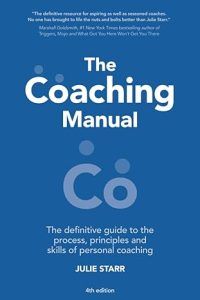
This insightful book explores and explains the coaching journey from start to finish.
Starr’s book offers a range of free resources and gives clear guidance to support new and existing coaches in providing practical help to their clients.
Find the book on Amazon .
2. The Big Leap: Conquer Your Hidden Fear and Take Life to the Next Level – Gay Hendricks
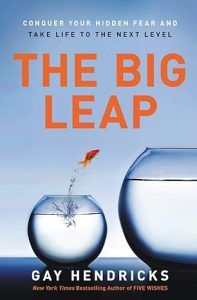
Delving into the “zone of genius” and the “zone of excellence,” Hendricks examines personal growth and our path to personal success.
This valuable book explores how we eliminate the barriers to reaching our goals that arise from false beliefs and fears.
3. The Gifts of Imperfection: Let Go of Who You Think You’re Supposed to Be and Embrace Who You Are – Brené Brown
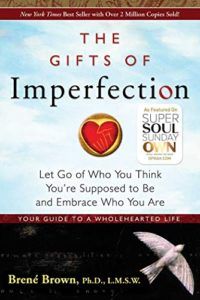
Brown, a leading expert on shame, vulnerability, and authenticity, examines how we can engage with the world from a place of worthiness.
Use this book to learn how to build courage and compassion and realize the behaviors, skills, and mindset that lead to personal development.
We have many resources available for fostering personal development and supporting client transformation and growth.
Our free resources include:
- Goal Planning and Achievement Tracker This is a valuable worksheet for capturing and reflecting on weekly goals while tracking emotions that surface.
- Adopt a Growth Mindset Successful change is often accompanied by replacing a fixed mindset with a growth one .
- FIRST Framework Questions Understanding a client’s developmental stage can help offer the most appropriate support for a career change.
More extensive versions of the following tools are available with a subscription to the Positive Psychology Toolkit© , but they are described briefly below:
- Backward Goal Planning
Setting goals can build confidence and the skills for ongoing personal development.
Backward goal planning helps focus on the end goal, prevent procrastination, and decrease stress by ensuring we have enough time to complete each task.
Try out the following four simple steps:
- Step one – Identify and visualize your end goal.
- Step two – Reflect on and capture the steps required to reach the goal.
- Step three – Focus on each step one by one.
- Step four – Take action and record progress.
- Boosting Motivation by Celebrating Micro Successes
Celebrating the small successes on our journey toward our goals is motivating and confidence building.
Practice the following:
- Step one – Reflect momentarily on the goal you are working toward.
- Step two – Consider each action being taken to reach that goal.
- Step three – Record the completion of each action as a success.
- Step four – Choose how to celebrate each success.
If you’re looking for more science-based ways to help others reach their goals, check out this collection of 17 validated motivation & goal achievement tools for practitioners. Use them to help others turn their dreams into reality by applying the latest science-based behavioral change techniques.

17 Tools To Increase Motivation and Goal Achievement
These 17 Motivation & Goal Achievement Exercises [PDF] contain all you need to help others set meaningful goals, increase self-drive, and experience greater accomplishment and life satisfaction.
Created by Experts. 100% Science-based.
Personal development has a rich and long history. It is underpinned by various psychological theories and remains a vital aspect of creating fulfilling lives inside and outside coaching and counseling.
For many of us, self-improvement, self-awareness, and personal growth are vital aspects of who we are. Coaching can provide a vehicle to help clients along their journey, supporting their sense of autonomy and confidence and highlighting their potential (Cox, 2018).
Working with clients, therefore, requires an open, honest, and supportive relationship. The coach or counselor must believe the client can achieve better results and view them nonjudgmentally as equal partners.
Personal development plans become essential to that relationship and the overall coaching process. They capture areas for development, skills and behaviors required, and goals and objectives to work toward.
Use this article to recognize theoretical elements from psychology that underpin the process and use the skills, guidance, and worksheets to support personal development in clients, helping them remove obstacles along the way.
Ultimately, personal development is a lifelong process that boosts wellbeing and flourishing and creates a richer, more engaging environment for the individual and those around them.
We hope you enjoyed reading this article. Don’t forget to download our three Goal Achievement Exercises for free .
Personal development is vital, as it enables individuals to enhance various aspects of their lives, including emotional wellbeing, relationships, careers, and overall happiness.
It promotes self-awareness, self-improvement, and personal growth, helping individuals reach their full potential and lead fulfilling lives (Passmore, 2021; Starr, 2021).
Personal development is the journey we take to improve ourselves through conscious habits and activities and focusing on the goals that are important to us.
Personal development goals are specific objectives individuals set to improve themselves and their lives. Goals can encompass various areas, such as emotional intelligence, skill development, health, and career advancement, providing direction and motivation for personal growth (Cox, 2018; Starr, 2021).
A personal development plan typically comprises defining the area of development, setting development objectives, identifying behaviors to develop, planning actions for progress, and establishing completion dates. These five stages help individuals clarify their goals and track their progress (Starr, 2021).
- Bandura, A. (1977). Social learning theory . Prentice-Hall.
- Beck, A. T., & Haigh, E. P. (2014). Advances in cognitive therapy and therapy: The generic cognitive model. Annual Review of Clinical Psychology , 10 , 1–24.
- Beck, J. S. (2011). Cognitive behavior therapy: Basics and beyond . Guilford Press.
- Cottrell, S. (2015). Skills for success: Personal development and employability . Bloomsbury Academic.
- Cox, E. (2018). The complete handbook of coaching . SAGE.
- Ellis, A. (2000). Can rational emotive behavior therapy (REBT) be effectively used with people who have devout beliefs in God and religion? Professional Psychology-Research and Practice , 31 (1), 29–33.
- Erikson, E. H. (1963). Youth: Change and challenge . Basic Books.
- Illeris, K. (2018). An overview of the history of learning theory. European Journal of Education , 53 (1), 86–101.
- Lomas, T., Hefferon, K., & Ivtzan, I. (2014). Applied positive psychology: Integrated positive practice . SAGE.
- Maslow, A. H. (1970). Motivation and personalit y (2nd ed.). Harper & Row.
- Passmore, J. (Ed.). (2021). The coaches’ handbook: The complete practitioner guide for professional coaches . Routledge.
- Piaget, J. (1959): The Psychology of intelligence . Routledge.
- Rose, C. (2018). The personal development group: The students’ guide . Routledge.
- Ryan, R. M., & Deci, E. L. (2018). Self-determination theory: Basic psychological needs in motivation, development, and wellness . Guilford Press.
- Seligman, M. E. (2011). Authentic happiness using the new positive psychology to realize your potential for lasting fulfillment . Nicholas Brealey.
- Starr, J. (2021). The coaching manual: The definitive guide to the process, principles and skills of personal coaching . Harlow: Pearson Education.
- Whitmore, J. (2009). Coaching for performance . Nicholas Brealey.
Share this article:
Article feedback
Let us know your thoughts cancel reply.
Your email address will not be published.
Save my name, email, and website in this browser for the next time I comment.
Related articles

Personal Development Goals: Helping Your Clients Succeed
In the realm of personal development, individuals often seek to enhance various aspects of their lives, striving for growth, fulfillment, and self-improvement. As coaches and [...]

How to Perform Somatic Coaching: 9 Best Exercises
Our bodies are truly amazing and hold a wellspring of wisdom which, when tapped into, can provide tremendous benefits. Somatic coaching acknowledges the intricate connection [...]


Training in Lifestyle Coaching: 8 Best Certifications and Courses
What makes the Wizard of Oz storyline so compelling? Maybe it’s that we relate to Dorothy’s struggle and her feelings of being stuck, lost, and [...]
Read other articles by their category
- Body & Brain (49)
- Coaching & Application (57)
- Compassion (26)
- Counseling (51)
- Emotional Intelligence (24)
- Gratitude (18)
- Grief & Bereavement (21)
- Happiness & SWB (40)
- Meaning & Values (26)
- Meditation (20)
- Mindfulness (45)
- Motivation & Goals (45)
- Optimism & Mindset (34)
- Positive CBT (29)
- Positive Communication (20)
- Positive Education (47)
- Positive Emotions (32)
- Positive Leadership (18)
- Positive Parenting (4)
- Positive Psychology (33)
- Positive Workplace (37)
- Productivity (17)
- Relationships (46)
- Resilience & Coping (36)
- Self Awareness (21)
- Self Esteem (38)
- Strengths & Virtues (32)
- Stress & Burnout Prevention (34)
- Theory & Books (46)
- Therapy Exercises (37)
- Types of Therapy (64)
Home — Essay Samples — Life — Personal Growth and Development — Personal Development Journey: Practices Learned in Counseling
Personal Development Journey: Practices Learned in Counseling
- Categories: Counseling Personal Development Planning Personal Growth and Development
About this sample

Words: 1851 |
10 min read
Published: Aug 31, 2023
Words: 1851 | Pages: 4 | 10 min read
Table of contents
Introduction, exploring personal development in counseling, core conditions and helping relationships, works cited.

Cite this Essay
Let us write you an essay from scratch
- 450+ experts on 30 subjects ready to help
- Custom essay delivered in as few as 3 hours
Get high-quality help

Dr. Karlyna PhD
Verified writer
- Expert in: Psychology Life

+ 120 experts online
By clicking “Check Writers’ Offers”, you agree to our terms of service and privacy policy . We’ll occasionally send you promo and account related email
No need to pay just yet!
Related Essays
2 pages / 694 words
1 pages / 673 words
1 pages / 676 words
2 pages / 785 words
Remember! This is just a sample.
You can get your custom paper by one of our expert writers.
121 writers online
Still can’t find what you need?
Browse our vast selection of original essay samples, each expertly formatted and styled
Related Essays on Personal Growth and Development
The impact of a mother's influence is immeasurable, shaping not only our early experiences but also the course of our lives. In this essay, I delve into the myriad ways in which my mom's guidance, love, and values have [...]
Kohlberg, Lawrence. 'The Philosophy of Moral Development: Moral Stages and the Idea of Justice.' Harper & Row, 1981.Rest, James R. 'Development in Judging Moral Issues.' University of Minnesota, 1979.Turiel, Elliot. 'The [...]
Help.open.ac.uk. (2019). Friends and family: When study gets difficult - Help Centre - Open University. Available at: Jou
Advantages of living alone essay delves into the liberating and transformative experience of residing independently. Living alone provides individuals with a unique opportunity to embrace autonomy, personal growth, and [...]
As a child, teen, and adult we go through many stages of changes and developments from our physical stature to our emotional stages. Even the way we think can sometimes go from wanting to be an artist when we grow up to wanting [...]
In life, we encounter numerous experiences that leave a lasting impact on our personal growth and development. These singular experiences, defined as those unique and significant moments that shape our lives, have the power to [...]
Related Topics
By clicking “Send”, you agree to our Terms of service and Privacy statement . We will occasionally send you account related emails.
Where do you want us to send this sample?
By clicking “Continue”, you agree to our terms of service and privacy policy.
Be careful. This essay is not unique
This essay was donated by a student and is likely to have been used and submitted before
Download this Sample
Free samples may contain mistakes and not unique parts
Sorry, we could not paraphrase this essay. Our professional writers can rewrite it and get you a unique paper.
Please check your inbox.
We can write you a custom essay that will follow your exact instructions and meet the deadlines. Let's fix your grades together!
Get Your Personalized Essay in 3 Hours or Less!
We use cookies to personalyze your web-site experience. By continuing we’ll assume you board with our cookie policy .
- Instructions Followed To The Letter
- Deadlines Met At Every Stage
- Unique And Plagiarism Free
Remember me?

Personal Development Counselling

The personal development of individuals has various ways of manifesting. It takes a different meaning depending on each individual’s life circumstances. Working towards personal development involves overcoming psychological, emotional and/or background obstacles. It makes us grow and leave behind past attitudes that were keeping us stuck in a place instead of getting ahead in our lives. It makes us feel alive and vibrant, willing to try new things and increase our self-confidence.
When you start to discover how to see things from a different perspective, it becomes possible to grow and move forward. From time to time we all get stuck in chronic situations and viewpoints that create suffering. We can’t see other perspectives, consider new ideas or create movement from it. We cannot see a solution for a problem that seems to be existential. However, there is always a way. Through finding new meanings and changing our behaviour, we change the way we feel about others, the future and ourselves. There are various ways to achieve this. In this blog, we will focus on a specific way of achieving personal change.
How does it look like to work towards Personal Development Counselling?
You can choose the areas of your life you want to focus for your development. You may choose these areas because you are not satisfied where you are and you want to do better. The goals for personal development are usually related to:
- Mental health (i.e.: depression, anxiety, anger)
- Career: a sense of dissatisfaction related to current status in one’s own career
- Personal Relationships: friendships and romantic
- Family relationships
- Self-esteem/Self-confidence
- Education: desire to get a degree or change program
- Health/Exercise/Nutrition
What is a personal development Counselling plan?
For a busy working person, personal development may involve spending time doing activities to refresh and replenish their energy, to feel alive again instead of feeling the sense of doom that comes from rushing to meet deadlines and demands. For example, it could mean to start spending time in nature, doing exercise, meditation and finding time to see friends.
For a grieving individual, it could be to be able to find new meaning to the loss, internalize the good memories of the loved one and be able establish relationships with others and feel they have the right to be excited and happy again after the loss.
For a an individual with a mental health disorder, it could be to live their life based on his/her values rather than on the impulses of their mood swings and dysfunctional behaviour. In terms of goals this could be to replace the yelling at family members with going for a walk or to be compassionate to others instead of aggressive.
A plan for personal development consists of 5 steps.
- What is your goal? What would you like to achieve?
For example: I want to have more time to stop living in automatic pilot and enjoy my life. I want to be present in the midst of my busy schedule and daily responsibilities.
- Where are you now in terms of your goal?
What are you currently doing or not doing in this area?
In our example: I spend most time working, get home tired with no energy to play with my kids. Don’t see my friends much and feel a bit isolated. Feel anxious with all the workload.
- Play with my children 30 minutes a day
- Walk 30 minutes a day
- Meet with friends twice a week, for coffee or lunch
- Do 20 minutes of meditation daily
Identify some of the small steps you can take in order to advance towards your goal.
You can plan to increase your steps daily, weekly, biweekly or with the frequency that you feel is realistic for you. If you are planning to introduce a new habit into your life, it’s easier to start with a short period of time but do it daily and increase time as the days go by. Each new day of practice will usually feel easier to do the new activity than the day before. You can use this method for studying, exercising, working and any activity you would like to start doing.
GOALS: Goals have to be SMART.
Smart stands for:
S PECIFIC: one at a time (play 30 minutes a day with my children)
M EASURABLE: 30 minutes a day by the end of the month
A CHIEVABLE: Can you accomplish this change in 2 weeks or do you need a month to adjust your schedule? Plan for success. Better slower but sure.
R EALISTIC: Can you make 30 minutes a day to devote completely to your children? If the answer is no, go for 10 minutes.
T IME LIMITED: Want to try this for a month and see how it goes? Maybe after a month, you want to try a different way of bonding with your children and take them out twice a week or create a special family tradition to do over dinner such as talking about what made them happy during the day.
If you feel excited about working towards your personal development, go for it! Start by identifying the areas in your life that you could do better by your own standards and values. Then define your goal. You can have goals for different areas of your life such as family relationships, career, free time, etc.
Then go through the SMART goals plan to define them. Plan a series of steps to get from where you are now to where you want to be.
Start taking the steps one at a time. Enjoy your personal development!
CBT Psychology For Personal Development has an experienced Vaughan Psychologists who work with of child therapy .
Related Articles
- individual therapy
- Mindfulness Meditation Resources
Book an appointment today. Written By: Dr. Silvina Galperin PhD, C. Psych.
About Dr Silvina Galperin
Dr. Silvina Galperin is a Clinical and Counselling Psychologist and the founder and director of CBT Psychology for Personal Development in Thornhill, Ontario.
You also might be interested in

7 Things you can do to Manage your Anger
We all know what anger feels like. It’s that rage[...]

How Do I Know If My Teen Needs Counselling?
Do you remember your teen years? You know, that time[...]

Procrastination: How To Be More Productive
I’ve always been a productive student, but over the course[...]
Reasons for Treatment
Treatments we use, types of sessions, find us here.
Find us here
- CBT Psychology for Personal Development
- 7626 Yonge St, Thornhill, ON L4J 1V9
- 905-597-4404
- info@cbtpsychology.com
Fresh from our blog
- A Journey to Joy: Overcoming Anxiety in Pregnancy
- From Worry to Wellness: A Guide to Managing Anxiety During Pregnancy
- From Darkness to Light: One Mother’s Journey through Postpartum Depression
- The Strength to Reach Out: Overcoming the Stigma of Postpartum Depression
For tips and news sign up to our newsletter
You have Successfully Subscribed!

Generalized Anxiety Disorder (GAD)

Obsessive-Compulsive Disorder (OCD)

Social Anxiety Disorder

Phobia Treatment

Separation Anxiety Disorder

CBT for Adults

CBT for Children

Paranoid Personality Disorder

Schizotypal Personality Disorder

Schizoid Personality Disorder

Antisocial Personality Disorder

Borderline Personality Disorder (BPD)

Narcissistic Personality Disorder

Obsessive-Compulsive Personality Disorder (OCPD)
- Free Samples
- Premium Essays
- Editing Services Editing Proofreading Rewriting
- Extra Tools Essay Topic Generator Thesis Generator Citation Generator GPA Calculator Study Guides Donate Paper
- Essay Writing Help
- About Us About Us Testimonials FAQ
- Studentshare
- Personal Development in Counselling Training
Personal Development in Counselling Training - Essay Example
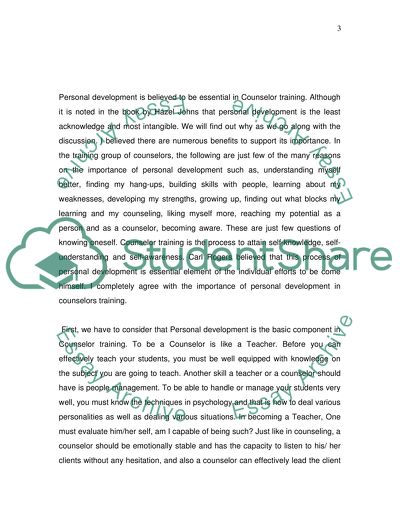
- Subject: Psychology
- Type: Essay
- Level: Masters
- Pages: 5 (1250 words)
- Downloads: 10
- Author: derdman
Extract of sample "Personal Development in Counselling Training"
- 19 propositions of carl rogers
- Carl Rogers
- Know Thyself
- Cited: 7 times
- Copy Citation Citation is copied Copy Citation Citation is copied Copy Citation Citation is copied
CHECK THESE SAMPLES OF Personal Development in Counselling Training
Careers in psychology, human resources training manager, group counseling observation, training employees as a cashier, mindset: the new science of personal transformation.

- TERMS & CONDITIONS
- PRIVACY POLICY
- COOKIES POLICY

IMAGES
VIDEO
COMMENTS
Personal development is 'an essential aspect of training in person-centred psychology and person-centred therapy and, generally, takes place and is fostered in the training group (as distinct from individual personal therapy away from training)' ( Tudor and Merry, 2002: 97-98 ). In counselling, personal development is a way of enhancing ...
Critically evaluate your development to date and discuss implications for how you communicate and apply your interpersonal skills. In this essay I intend to discuss why personal development is important in counselling, how I have developed during the course and how my communication and interpersonal skills have changed both my personal and ...
Abstract. This reflective essay offers a personal account of my experience during my counselling psychology training. Research highlights that the person of the therapist contributes to clients' improvement beyond the intervention, advocating the importance of personal development beyond a competency-based model.
In this paper, we present our development of a previously articulated approach to counselling education of transformational learning through a relational dynamic approach (Macaskie et al., 2013).
Personal Development in Counselling Integration. This assignment is a reflective essay on my own integrative counselling practice style. To start off with I will be identifying and evaluating characteristics of the therapeutic relationship when using an integrative or an eclectic approach. Next, I will be exploring and demonstrating practical ...
View metadata, citation and similar papers at core.ac.uk brought to you by CORE ... Specific Training Experiences that Impact Counseling Students' Personal Growth ... Personal Development: an aspect of personal change that is purposeful, structured and specific, a planned measurable change that seeks to develop specific skills and qualities ...
It will support your personal development and professional development throughout your counselling training and into your practice, By Bager-Charleson, du Plock,S., van Rijn, B., & Wright, J.2020 Content • • • • • • • • • • Reflective practice: An overview Personal development Your support and development Reflecting on ...
A personal guiding theory of counseling is a counselor's foundational philosophy of how people grow, change, and develop that guides therapeutic work with clients (Barth et al., 2019). Developing ...
Reflective Practice and Personal Development in Counselling and Psychotherapy SECOND EDITION Sofie Bager-Charleson - Metanoia Institute June 2020 | 184 pages | SAGE Publications Ltd Format Published Date ISBN Price Paperback 12/06/2020 9781526477491 £25.99 Hardcover 12/06/2020 9781526477507 £75.00 Electronic Version 01/06/2020 9781529726015 ...
Personal Development in Counselling and Psychotherapy by Bager-Charleson, S. ... In the third and last essay, Erikson deals with "The Problem of Ego Identity" successively from biographical, clinical, and social points of view--all dimensions later pursued separately in his work.
One of the emerging hallmarks of the field of counselling in the recent years has been an increased convergence between the major theoretical orientations in their views regarding the ... Personal development in counsellor training: towards a clarification of inter-related concepts. Mark Donati Department of Psychology, London Metropolitan ...
Personal development groups (PDGs) are a common part of counselling, psychotherapy and psychology training programmes, and are believed to facilitate both personal and professional growth.
Counselling is a professional role, training requires a level of appreciation of the need to develop on a personal level, therefore an understanding of client's boundaries, developing self-awareness skills are explicitly crucial in training. Self-awareness is not easy to acknowledge, but theories of Gestalt Therapy will provide an insight how ...
First Edition. There is an increased emphasis on self awareness and self care in counselling and psychotherapy training, with a focus on how the therapist as a person affects the therapeutic outcome. This timely book responds to these complex issues and is designed to help counselling students, trainees and graduates with integrating their ...
Bandura's social cognitive theory. Albert Bandura's (1977) theory highlights the role of social learning and self-efficacy in personal development. It emphasizes that individuals can learn and grow through observation, imitation, and belief in their ability to effect change. 5. Self-determination theory.
Introduction. In session 1, the lecture was centred around introducing the module, and its structure. I was given an overview of reflective practice as well as development and helping skills in counselling, and I learnt about some of the conceptual and historical issues that counselling, and psychotherapy comes across. During lecture 1, I was introduced to the concept of the personal ...
Professional Developm ent for counsellors enables counsellors maintain currency (Neimeyer. et al., 2010) and improve their level of competence for the duration of their careers, and. ensure that ...
The title of this essay is "The Voyage" . It's a reflective essay, and I am using the Gibbs Reflective Cycle (Gibbs, 1988) as a template for this exercise. It's a critical reflection on the importance of personal development and self-awareness, which are necessary if one is successful in becoming, and remaining a councillor.
Personal development is an essential element in counselling training: Discuss? This essay will aim to define what personal development is to me as a trainee counsellor. It will reflect on the importance of personal development to a trainee counsellor by looking at different theorists and their views on personal development.
Working towards personal development involves overcoming psychological, emotional and/or background obstacles. It makes us grow and leave behind past attitudes that were keeping us stuck in a place instead of getting ahead in our lives. It makes us feel alive and vibrant, willing to try new things and increase our self-confidence.
An insightful piece of research, comes from Grimmer and Tribe (2010) who interviewed newly qualified and trainee counsellors. These findings concluded that personal therapy plays an important role in encouraging the trainee to gain a sense of self through the development of reflexivity, which comes from the experience of being a client.
The author of the paper "Personal Development in Counselling Training" believes that personal development is a very basic component in Counselors' training to be able to work efficiently and professionally and s\he is currently training to be a Counselor in Cognitive behavior…